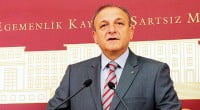Why is the government freeing bloody murderers?

Date posted: March 20, 2014
ORHAN KEMAL CENGİZ
The government is continuing to act in panic. In the last couple of months, every single step it has taken has somehow been related to the graft probe, and they all are being taken to suffocate the corruption investigation.
Most of the Ergenekon suspects (the people who were behind bars for allegedly planning a military coup against the government) have been released. One of the prime suspects in the Hrant Dink murder is now free. Even murderers who were caught red-handed on the scene have been released from prison. But how and why has all of this happened?
The government has only one argument against the corruption charges. It is this: There is an illegal structure within the police and judiciary, and this has created the probe against the government. This graft probe is a new coup attempt against the government in the disguise of a corruption investigation.
No matter how concrete the allegations or how strong the evidence in the investigation file, the government is in complete denial.
And it has made quite an important strategic decision. To support their ineffective argument that all these files against them have been produced by a gang within the police and judiciary, they are freeing the Ergenekon suspects, who had originally produced this line of defense, namely that they had been made the victims of fabricated evidence brought against them by a “gang” in the police and judiciary.
Does all of this seem a bit confusing? It is not, actually. All I am saying is this: The government is freeing Ergenekon suspects willingly and on purpose to create an alliance against the so-called “parallel state,” as they call the movement inspired by Fethullah Gülen.
When the Constitutional Court decided that the total duration of pre-trial detention could not exceed five years, the government saw this as an opportunity to advance its case. When the Constitutional Court delivered this judgment, it also gave the government one year to make the necessary legal changes. And this time limit would have been reached in August. If the government had waited until August, probably no suspects in the Zirve Publishing House or Dink murders would have been released, because in that time the trials would have been completed, or at least the courts of first instance would have delivered their judgments. And, of course, when the government was introducing the new law, it was well aware that all these murderers would be freed. It did not care about the “side effects.” It focused on “the big picture.” It was in a hurry to release the Ergenekon suspects.
It believed the Ergenekon suspects would join it in its fight against the so-called “parallel state.” It thought all these Ergenekon suspects would talk quite loudly about the evils of the parallel state and would become supporters of its argument that there is a “structure” within the state that produces false evidence and has created false accusations first against soldiers and now against the government. And, in this way, the people would believe that there were no solid accusations or concrete evidence in the graft probe against the government.
If you ask me, the government’s strategy of “perception management” is childish, amateurish and doomed to backfire.
The government, once the most ardent supporter of the Ergenekon cases, had even denied the apparent shortcomings in these cases. Now it is in a diametrically opposite position, arguing that everything was wrong in these cases. It has even freed some suspects. No one in Turkey can honestly have any suspicion that the suspects did not do many terrible things in the past; they were at the center of coup attempts.
We will see whether these people play the role given to them by the government or start their old activities again, which had been stopped by these trials.
Source: Todays Zaman , March 20, 2014
Tags: Defamation of Hizmet | Democracy | Hizmet and politics | Turkey |
























